A few days ago, the Polish Homeland Security Agency announced the arrest of three men suspected of committing arson attacks on the Hungarian Cultural Society office in Uzhhorod on 4 February 2018. The arrest was coordinated with the Ukrainian SBU. Two men - who were identified among the arsonists – were sentenced to three months; another was released under police surveillance. Investigators are currently examining international contacts related to these suspects.
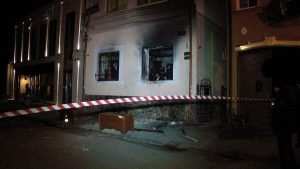
The fact that the provocateurs, who threw a Molotov cocktail into the building, are foreigners was revealed shortly after the arson attack, just adding fuel to fire in current disputes between Ukraine and Hungary.
The Governor of Zakarpattia Oblast, Hennadiy Moskal, stated that citizens of an EU country were involved in this case, and announced their names on February 21: 21-year-old Adrian Marglewski from Krakow and 25-year-old Tomasz Rafal Szimkowiak from Bydgoszcz. Both are members of the right-wing radical neo-fascist organization Falanga, which stridently proclaims its support of the so-called “DNR/LNR” immediately after the start of Russian aggression in the Donbas.
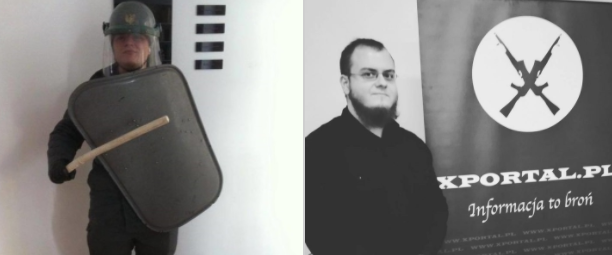
More: Polish pro-Russian far-right radicals behind arson attempt of Hungarian center in Ukraine
Falanga-ONR was a small Polish political nationalist organization of the 1930s. Today, its followers march under such slogans as: “A strong nation and a powerful country!” and “Great Catholic Poland.”
Falanga positions itself as a group that is in favor of creating an alternative to “Euro-Atlantic subjugation” of Poland. Its media resource – X-portal – calls on members to fight against “American imperialism” and the “Zionist diktat” and support countries suffering from conflicts initiated by the United States and Israel.
In the inter-war years, Falanga was strongly opposed to Polish leftist movements, but it seems that today’s Falanga organization has embraced leftist ideology – it has many connections with the Polish pro-Kremlin party Zmiana (Change), which professes an ultra-leftist ideology. These two Polish political parties – Falanga and Zmiana - which actually belong to opposing ideological camps, are united in their extreme anti-Americanism and unwavering support for Putin’s tough stance.
The leader of the Falanga organization and editor-in-chief of the X-portal, is Bartosz Bekier, a young political science graduate, Putin sympathizer and opponent of NATO, who proudly flaunts the Russian St. George ribbon, and tries to frighten his countrymen with lurid tales of Ukrainian “banderites”. He claims that he is employed as an “independent journalist”, supposedly working to “counterbalance pro-American discourse that prevails in the Polish media”. In 2013, Bekier was invited by the government of Bashar al-Assad to visit Syria, and in February 2014, he was at the Maidan in Kyiv, where he searched for portraits of Stepan Bandera.

However, Bekier’s greatest claim to fame might have occurred in the summer of 2014, when he traveled to the Donbas where he recorded interviews with the leaders of the so-called “DNR,” and hosted a panel on national revolutions. During a separatist rally in Donetsk in the summer of 2014, Bartosz Bekier spoke the following words:
“I’m not a representative of the Polish Atlantic Council. I represent the Polish people who oppose the presence of NATO terrorists in Poland.”
Several other Falanga members accompanied Bekier during his visit to Eastern Ukraine.
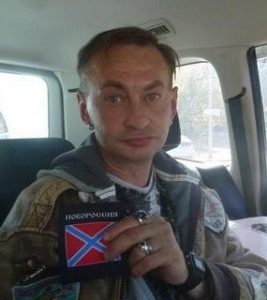
One of them - Dariusz Lemanski - is wanted by Poland’s prosecutor's office for participating in illegal foreign armed groups. However, Lemanski and another Falanga follower - Dawid Hudziec – have left Poland.
In August 2014, Bekier led a Falanga rally with “DNR” and “LNR” flags before the Ukrainian Embassy in Warsaw, protesting against “Jewish fascism” in power in Kyiv, and called on Polish citizens to protect the “Novorossiya community” from Ukrainian President Petro Poroshenko. In October 2014, Ukrainian border guards banned several Falanga representatives from entering Ukraine for three years.
Bekier then bragged about the ban on Facebook, posted his passport photo and the stamp, and added the following remark:
“I wonder what will last longer – this ban or President Poroshenko?”
Later, X-portal announced that Ukrainian authorities were drawing up a blacklist of people that do not share “Kyiv’s official propaganda ideology” regarding the conflict in the Donbas.
X-portal continues to track events in Ukraine.
In their publications, Falangists make direct parallels between the 1943-44 events in Volyn and Kyiv’s policy in the Donbas, calling Ukraine’s Anti-Terrorist Operation (ATO) a “genocide.”
In fact, they are intent on building up feelings of anger and hostility, adding fuel to fire in the dispute between Ukraine and Poland.
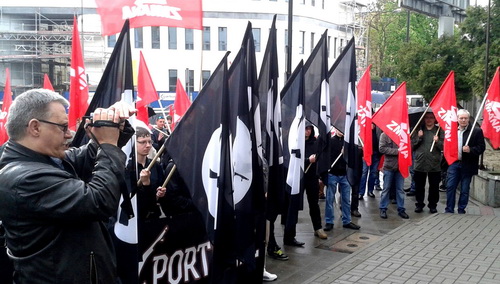
In order to protect Poland from “possible aggressive actions by banderites,” in the summer of 2015 Falanga announced the creation of militarized patrols in Southeastern Poland, which would guard the border from “night-time banderite raids.” Although a video posted on the Internet confirms that Polish law was violated - since ordinary citizens cannot arbitrarily act as border guards or other law enforcement agencies – the Falanga participants have never been bothered by the police or placed under arrest.
In addition, Bekier even acted as deputy of Zmiana’s leader Mateusz Piskorski, who was detained on suspicion of spying for Russia.
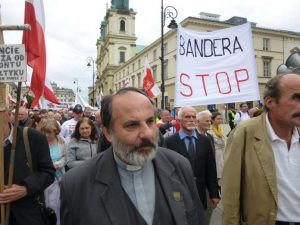
Falanga has other interesting personal contacts. Last year, a well-known “anti-banderite” priest Tadeusz Isakovich-Zaleski organized a remembrance day in Krakow for Polish genocide victims of Kresy Wschodnie*, and invited Bekier to be a member of the honorary committee for this event. Members of the committee included First Deputy Minister of Justice Patryk Jaki and rapper Maciej Ptak (Bird) Ptasznik, composer of such hits as Kosovo is Serbian and The Despicable Police!
*Eastern part of the Second Polish Republic during the interwar period constituting nearly half of the territory of the state. Today, these territories are divided between Western Ukraine, Western Belarus, and South-eastern Lithuania-Ed.
In 2016, Falanga leaders expressed their interest in becoming part of the Territorial Defense Forces that Poland decided to set up to counteract Russian threats.
These units were to include the Krakowska jednostka strzelecka (Riflemen’s Association), which has about 80 members, of which twelve are Falanga members or have close ties to Zmiana. In fact, in the summer of 2016, the co-founder of the association, Michał Prokopowicz, participated in a rally against the NATO summit being held in Warsaw.
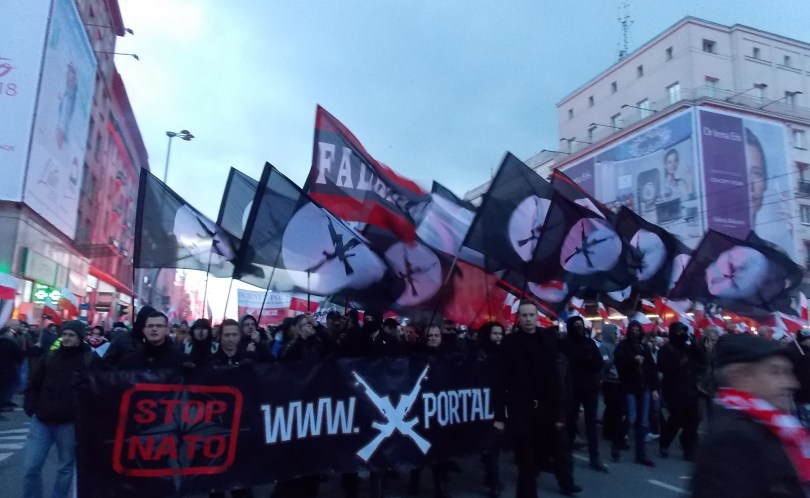
The “Riflemen” even managed to take part in NATO’s Anaconda exercises, but after it was publicly reported in the media, the Polish Ministry of Defense decided to curtail cooperation with this organization.
Today, this pro-Kremlin organization in Poland has extended its activities to neighboring countries. The participation of Falanga members in the arson attacks on the Hungarian Cultural Society office in Uzhhorod opens a new page in the long history of provocations committed against national minorities or foreign diplomatic missions in Ukraine.
If earlier the Ukrainian government’s statements about the “Kremlin trail” were perceived by many as an excuse, then today the reputation of the Falanga group points to the fact that the group might have received direct orders from Moscow.
There is enough evidence for a very dangerous tendency. In order to alienate Kyiv from its western neighbors, Moscow would use resources available in Ukraine and attract citizens from other countries to act on the Kremlin’s behalf.
Why did the Kremlin decide to use Polish citizens for provocations in Uzhhorod?
Dariusz Materniak, an editor of polukr.net, noted that the attack might have targeted Polish-Hungarian relations, which have recently grown much friendlier.
“It’s quite possible that the attack was a kind of 'brotherly assistance' offered by the Poles to their Hungarian brothers, who are so 'oppressed by this banderite government.' But, we shouldn’t rule out the side effects of such an attack, namely deterioration of Polish-Ukrainian relations.”
Whether it was intentional or not, the attack in Uzhhorod is bound to increase tensions between Ukraine and Poland.
It would be more than enough for Ukraine to start using the Uzhhorod incident as an argument in a public dialogue with Warsaw to heighten tension between the two countries. Such a strategy would be fully in line with the expectations of the organizers of the Uzhhorod attack, and may be an excuse for new provocations. Therefore, both Polish and Ukrainian politicians should pay attention and be careful about what they say.
The prompt investigation of the arson attack has not defused the tense atmosphere between Kyiv and Budapest. Immediately after Ukraine announced the arrest of the Polish arsonists, yet another arson attack was launched against the Hungarian Society on February 27. Despite several arrests in Poland, Budapest continues to blame Kyiv for the attacks.
Hungarians prefer to ignore the arsonists’ obvious ties with Moscow
At first, the representatives of the Hungarian Society announced that their office had not been attacked by Ukrainians, but after two days, they changed their statement. On February 28, they declared that it was namely the anti-Hungarian campaign in Ukraine that had led to the terrorist attack in Uzhhorod. And not a word about Russia!
Therefore, we cannot expect Viktor Orban to stop pressuring Ukraine even if there is a full and objective investigation of these events.
On March 4, the chief of the National Police, Serhiy Knyazev announced that the police had detained three people involved in an attack on the Hungarian Cultural Centre on February 27. One of them was detained in Cherkasy, another two were detained in Kropyvnytsky. In addition, the possible organizer of the attacks, a foreign citizen, was identified and put on the wanted list.

Read more:
- Polish pro-Russian far-right radicals behind arson attempt of Hungarian center in Ukraine
- Ukraine’s law enforcers bust gang plotting to blow up Hungarian monuments
- Ukraine’s new education law unleashes international storm over minority language status
- Experts weigh in on Ukraine’s hotly debated new minority language policy
- Ukraine and Hungary both claim victory in Ukrainian education language argument
- Separatism Transcarpathian style: is Hungary aiming to grab a part of Ukraine?
- Hungary openly helping Putin destabilize Ukraine
- Spoiling Ukrainian-Polish relations: next phase in Kremlin’s hybrid war

